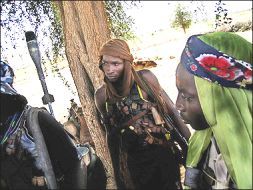AU hopes to launch peace talks despite rebel boycott
Sept 14, 2005 (ABUJA) — African Union officials hope to launch a final round of peace talks in the Nigerian capital Abuja to bring an end to slaughter and starvation in the war-torn western Sudanese region of Darfur.
 But the chances of the dialogue making rapid progress were dealt an early blow when one of two rebel groups represented at the talks declared it would not take part in negotiations.
But the chances of the dialogue making rapid progress were dealt an early blow when one of two rebel groups represented at the talks declared it would not take part in negotiations.
Previous sessions of the African Union-sponsored conference have made limited progress, with both sides accusing the other of breaking ceasefire promises.
But African Union (AU) officials are publicly confident that delegates will indeed make their way back to the negotiating table and that an agreement on power-sharing and the demobilisation of warring militias can finally be worked out, 30 months after fighting broke out.
“The peace talks will resume on September 15. We are expecting all the parties to attend the opening on Thursday here in Abuja,” Nigerian mediator Sam Ibok told AFP in Abuja.
“All AU officials who are involved in the talks are now in Abuja and all indications are that the talks will begin as planned tomorrow,” confirmed AU spokesman Desmond Ojako.
But in Cairo, the rebel Sudan Liberation Movement (SLM) said its delegates were only coming to Nigeria to inform AU officials that they plan to boycott the talks.
“Our position remains the same: we will not attend political negotiations on Thursday with the Sudanese government until we hold our general conference on September 25-27,” said a statement released by the group on Wednesday.
Ibok refused to comment on the statement, saying: “There are all sorts of stories in the media. We are not working on the basis of that, we are working on the basis of the reality on the ground. I advise you to wait until tomorrow and see who is present at the meeting.”
The negotiations had initially been scheduled for August 24, but were put off at the request of the SLM, which said it first needed to hold a conference of its members.
Analysts say the delay reflects a rift within the movement with one faction, headed by SLM leader Abdul Wahid Mohammed Nur, in favor of taking part and another, led by secretary general Mani Arko Minawi, wanting a postponement.
Delegates from a second rebel group, the Justice and Equality Movement (JEM), had begun arriving in Abuja on Wednesday, but did not want to comment ahead of the arrival of their top leadership.
Meanwhile, the Khartoum government has expressed confidence that the talks will make progress.
“The government delegation is fully mandated to conduct the negotiations and ensure that this round is decisive and final. The government is determined that 2005 shall be a year of peace,” chief negotiator Majzub al-Khalifa Ahmed told reporters on Sunday.
The African Union, which hosts the talks and which has deployed a peacekeeping force in Darfur, has accused SLM fighters of carrying out a bandit attack on August 25 in which a number of Arab nomads were killed and 3,100 camels stolen.
Fighting broke out in Darfur, an arid western region of Sudan about the size of France, in February 2003 when the two rebel groups rose in revolt against the Khartoum government.
The rebels claim to represent Darfur’s black African majority, which they say is discriminated against by the Arab-led regime. They have demanded greater regional autonomy and a bigger share in Sudan’s revenue from oil exports.
Khartoum’s response to the uprising was brutal. The government stands accused by the United Nations of arming the janjaweed, an Arab militia which has killed thousands of civilians.
UN officials estimate that more than 300,000 people have been killed and two million driven from their homes and into refugee camps, where they are prey to hunger, starvation and militia violence.
The structure of a deal to return peace to the region has been laid on the table in Abuja; a plan to demobilise the rival militias and enhance regional autonomy similar to the recent agreement which brought to an end a similar but much more protracted conflict in southern Sudan.
(AFP/ST)
